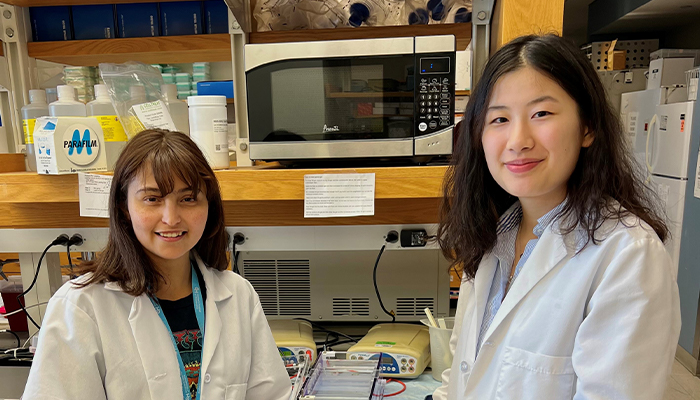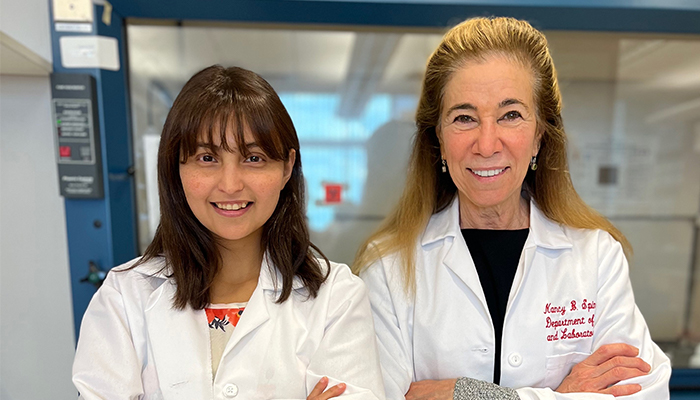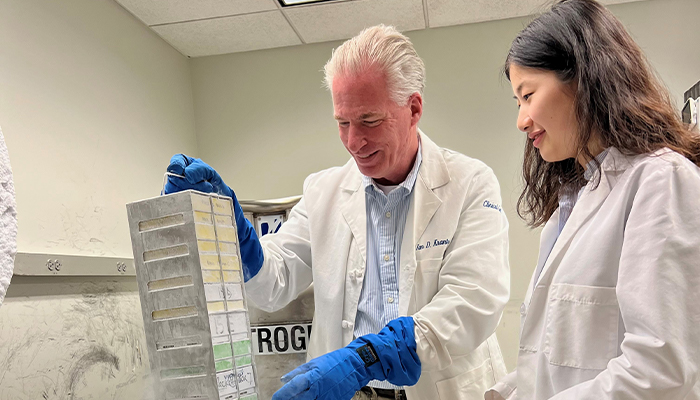HOW CAN WE HELP YOU? Call 1-800-TRY-CHOP
In This Section
Coming Full Circle: From Former Patients to Future Scientists

Emma Lo and Nicolette Valente returned to CHOP as interns after being patients here years ago.
One of the great rewards for pediatric researchers and physicians is seeing the children you treated grow into healthy and successful adults. This summer, Nancy Spinner, PhD, and Ian Krantz, MD, each welcomed a former patient back into their lives: This time as summer interns in their labs.
Dr. Spinner, chief of the Division of Genomic Diagnostics, and Dr. Krantz, director of the Roberts Individualized Medical Genetics Center, frequently work together to uncover the causes of a variety of genetic disorders. Their students this summer are working on research projects about the conditions that brought them to Children’s Hospital of Philadelphia as young children: Alagille syndrome and genetic hearing loss.
“We consider them to be like our kids,” Dr. Krantz said. “We made their diagnoses, followed them throughout their lives, and they reached out to us to help them foster their future careers. It’s wonderful to have seen them grow up and stay engaged and interested in science.”

Dr. Nancy Spinner and her intern Nicolette Valente Nancy Spinner.
Making Strides in Alagille Syndrome
In the Spinner Lab, Nicolette Valente, a biomedical engineering student at Drexel University, is working on research related to Alagille syndrome, an inherited liver disorder that adversely affects multiple body systems. Valente came to CHOP at 18 months of age for evaluation for a liver transplant in the Division of Gastroenterology and Nutrition after being diagnosed with Alagille syndrome. Dr. Spinner’s lab discovered the genes involved in the syndrome and the CHOP team identified her mutation – Valente is the focus of a paper that Dr. Spinner’s team published in 2002.
Patients with Alagille syndrome may experience mild or severe symptoms, and Valente is studying potential genetic reasons for the difference. Her project is focusing on the role of thrombospondin-2 as a genetic modifier of Alagille syndrome, working with a zebrafish model to show that overexpression of thrombospondin-2 correlates to severity of liver disease.
“I was always very interested in science, genetics, and the role of scientific research in the lives of patients,” Valente said. “From an early age, I knew I wanted to work in research, but I didn’t think it would be for Alagille Syndrome. It wasn’t until the opportunity arose to intern at the Spinner Lab that I serendipitously wound up doing research on my condition.”
Dr. Spinner is active in Alagille syndrome advocacy and education and has remained in touch with Valente and her family over the years.
“I really enjoy staying in touch with the families I’ve worked with These relationships continue to inspire our work and I hope that they provide some understanding about how science progresses to the patients and their families,” Dr. Spinner said. “Additionally, it’s a point of pride when people I train go on to continue working in the field. Working with Nicolette in the lab, after working with her and her family and the Alagille Syndrome Alliance, has been a unique experience. Many scientists discover their research interests by chance, but Nicolette is driven to help kids with the same rare diagnosis she has.”
Valente said it is incredibly rewarding to be back at CHOP as a budding researcher.
“Because of the care I received at CHOP, my health drastically improved, and I am at a place where I can, in a sense, return the favor,” Valente said.

Dr. Ian Krantz and his intern Emma Lo.
Finding Genetic Clues for Hearing Loss
Emma Lo spent the summer in the Krantz Lab, where one of the research areas is the genomics of hearing loss. Lo was a patient at CHOP when she was diagnosed with a genetic form of hearing loss. Today she is a biology and public health major at Brown University and is considering medical school.
“I’ve always been interested in the life sciences, and genetics particularly appeals to me because of its all-encompassing nature,” Lo said. “I found a letter from Dr. Krantz from about 15 years ago, and realized I had such a personal connection to the world of genetics. I reached out to Dr. Krantz to learn more about his work on my own condition, and now I’m working in his lab!”
Lo’s research this summer focused on evaluating the exome sequencing results for patients who haven’t received a definitive diagnosis for their hearing loss. The team is comparing the gene expression of non-hearing loss controls to the gene expression of these patients to see if they can identify new potential genetic causes of hearing loss. Lo is also working on a case review for a rare form of genetic hearing loss identified in a number of children in Dr. Krantz’s clinic.
Dr. Krantz treated Lo when she was four years old; that may have been years ago for Lo, but it feels like it was just yesterday to Dr. Krantz.
“It is exciting to see someone embrace the genetic hand they were dealt and come work in the lab and maybe make breakthroughs that will help kids with the same diagnoses down the road,” Dr. Krantz said.
Lo said it feels fitting to be back at CHOP in this new capacity, and she is grateful for a chance to contribute to research that can help change other children’s lives the way it changed hers.
“Seeing the advances in diagnostics and treatment since Dr. Krantz saw me as a patient is a testament to how much work he and his lab have done,” Lo said. “It is awe-inspiring to see how far the field has come.”